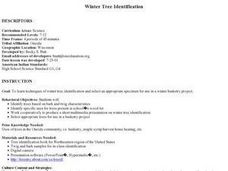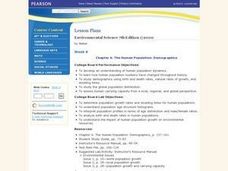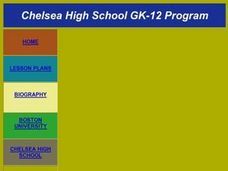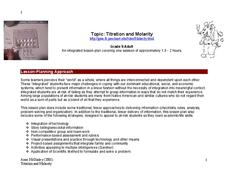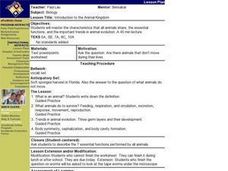Curated OER
Fresh Greens In The Home
Young scholars engage in the study of nutritional food choices that include fresh greens. They investigate the benefits of using simple planting techniques. The lesson also includes recipes for students to try out the habit of eating...
Curated OER
Case of the Missing Cookies
Students imagine they are a detective who has been asked to solve the theft of cookies from a jar in the student cafeteria. Students practice using the steps of the scientific method to solve the crime. Finally, students write a detailed...
Curated OER
Titration and Molarity
Students are introduced to the concepts of molarity and titration. As a class, they develop a list of the correct steps they need to follow to create a specific concentration of a solution. They design and complete an experiment in...
Curated OER
How Atoms Work
Learners analyze the way atoms function and how they combine to form molecules and various compounds. Using a software program, they create a diagram of an atom and write a summary about their functions. They complete a worksheet and...
Curated OER
Winter Tree Identification
Students utilize techniques of winter tree identification such as twig and bark characteristics. Students also identify specific uses for trees in school surrounding. They work cooperatively to produce a multimedia presentation on...
Curated OER
SPRING, BABY ANIMALS
Students act out pictures of baby animals from magazines, label each picture correctly, compare and contrast ways of caring for baby animals today with historical ways of caring for baby animals.
Curated OER
Chapter 6: The Human Population: Demographics
Students read the indicated text and complete several suggested labs and activities. They answer critical thinking questions. This lesson is very hard to do without the indicated text.
Curated OER
Ohio Animal Activity
Second graders explore the various animals of Ohio. They compare the activities of the different animals during the different seasons throughout the year. Students publish their findings in a report and share it with the class.
Curated OER
Dinosaur Days
Students investigate the age of dinosaurs while examining the characteristics of three kinds of dinosaurs. They examine plant eaters, meat eaters, and flying dinosaurs while determining how to classify things. They rotate through centers...
Curated OER
Inertia
Students conduct an experiment to apply Newton's first law of motion. They observe the inertia of an object in regard to its mass. The students record and graph the outcomes of their investigation and present the relationship between...
Curated OER
Mouthpart Madness
Learners explore the basic biology of a pest. They identify the four major kinds of insect mouthparts and explain how they work. Students examine the specific mouthparts and how they can limit food resources and in what environment an...
Curated OER
Pumpkins
Third graders create a pumpkin lantern. They work in groups to illustrate the growth of a pumpkin seed. Students are asked what they think of when they see the color orange. They choice one person from the group to get a piece of...
Curated OER
Oobleck
First graders explore Oobleck. They manipulate and observe the properties of Oobleck. Students discuss the differences between solids and liquids. They investigate Oobleck. Students write a sentence describing what they observed about...
Curated OER
Earth
Fourth graders have a spatial awareness of the plants by orally discussing what they saw after they stepped out the model of the solar system. They recognize the similarities and differences between Earth and the other planets by being...
Curated OER
Geographic Information Systems (GIS) and Water Resources
Students demonstrate how water quality and environmental health issues can be analyzed together, how hydrologic information can be built up, and how decisions can be made using GIS.
Curated OER
Lesson 6: Resonance
Students participate in a lab activity using three tuning forks of different frequencies and a Resonance Tube Set purchased from Sargent-Welch to take measurements of resonant lengths of the tuning fork frequencies. Students then try to...
Curated OER
How Atoms Work
Students explore the concept of atoms and how they combine to form molecules and compounds. In pairs, they read an article on how atoms work and discuss the main points. They draw atoms and write a paragraph about their elements.
Curated OER
Titration and Molarity
Students investigate the concept of molarity and its relationship to the concentration of a solution. After mixing chemical solutions, they calculate how many moles of acid and base should be in each solution. They record their results...
Curated OER
Math, Chemistry, and Food
Young scholars explore the effects of chemical reactions when cooking. Using the Internet, they research enzymes and then mix jello. They examine their results and test enzyme activity by adding pineapple to the jello. Finally, they...
Curated OER
How Large is a Mole of M&M's
Students calculate whether or not a mole of M&M's fill their high school. They practice factor-labeling, define a mole, and calculate the number of cubic feet per mole of M&M's. To answer the question they measure and calculate...
Curated OER
Introduction to the Animal Kingdom
Students are asked: Are there animals that don't move during their lives. They are asked what is an animal? Students discuss what animals need to survive. They are taught the trends in animal evolution. Students discuss the three...
Curated OER
Vegetable Faces: A Guiseppe Archimboldo Portrait Study
Students create drawings of vegetable faces.In this early childhood lesson plan, students identify various vegetables, which they use as models to create drawings. Students experiment with the vegetable drawings by adding faces to their...
Curated OER
What's In Crude Oil?
Middle schoolers investigate crude oil. In this crude oil lesson, students investigate fractional distillation and use this technique to separate two liquids.
Curated OER
SAY IT WITH DNA: Protein Synthesis Tutorial
Ninth graders explore protein synthesis. In this DNA lesson students complete a worksheet and a DNA lab activity.






